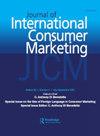奢侈品观念对高科技产品购买意愿的影响
IF 2.8
Q3 BUSINESS
引用次数: 1
摘要
摘要本研究考察了消费者对市场上越来越多的豪华高科技产品(LHTP)的看法。LHTP具有技术和奢侈元素两种截然不同的性质,因为当高科技产品意味着快速过时时,奢侈品意味着长期和永恒的使用。然而,目前还没有预测此类产品购买意向的理论框架。因此,本文将技术接受度模型(TAM)和品牌奢侈指数(BLI)作为研究框架。在线调查(N = 318)来检验研究假设。结果表明,TAM的两个变量(有用性和易用性)和BLI的两个变数(享乐主义和扩展自我)与购买意愿呈正相关。此外,当参与者感知到高度享乐主义时,易用性对购买意愿的积极影响可以增强。研究结果表明,当应用于LHTP时,奢侈品感知的主要和调节作用,这鼓励高科技产品设计师在设计中加入奢侈品属性。本文章由计算机程序翻译,如有差异,请以英文原文为准。
Effects of Luxury Perceptions on Purchase Intention of High-Tech Products
Abstract This study examines consumer perceptions toward the increasing number of luxurious high-tech products (LHTPs) on the market. LHTPs have two distinctly different natures of technology and luxury elements as that a luxury good suggests long-term and eternal use when the high-tech product implies quick obsolescence. However, currently, no theoretical framework exists for predicting the purchase intention of such products. Thus, this work integrates the technology acceptance model (TAM) and the brand luxury index (BLI) as a research framework. An online survey (N = 318) of three real-world LHTPs was conducted to test the research hypotheses. Results show that two variables (usefulness and ease of use) from the TAM and two variables (hedonism and extended self) from the BLI are positively associated with purchase intentions. In addition, the positive effect of ease of use on purchase intention can be enhanced when participants perceive high hedonism. The findings indicate the main and moderating effects of luxury perceptions when applied to LHTPs, which encourage high-tech product designers to include the luxury attributes in their designs.
求助全文
通过发布文献求助,成功后即可免费获取论文全文。
去求助
来源期刊
CiteScore
7.60
自引率
6.10%
发文量
29
期刊介绍:
The Journal of International Consumer Marketing examines consumer and organizational buyer behavior on a cross-cultural/national and global scale combining up-to-date research with practical applications to help you develop an action plan for successful marketing strategy development. Business professionals, policymakers, and academics share insights and "inside" information on a wide range of cross-cultural marketing issues, including international business customs, negotiating styles, consumer brand loyalty, price sensitivity, purchasing and leasing, consumer satisfaction (and dissatisfaction), and advertising.

 求助内容:
求助内容: 应助结果提醒方式:
应助结果提醒方式:


